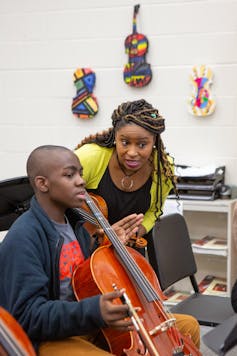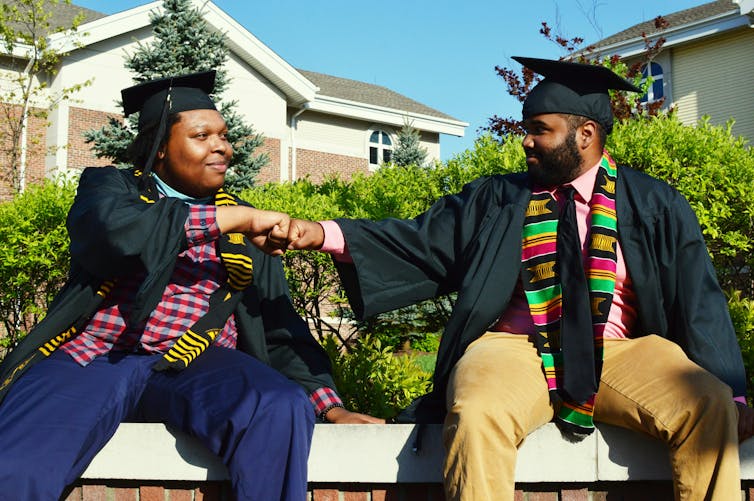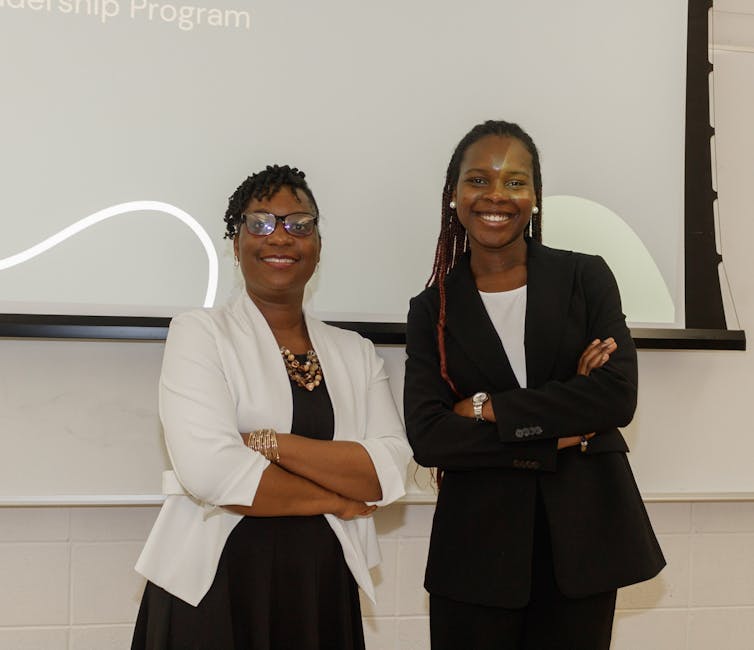Black youth in Canada experience poorer educational achievement than other children and youth, which leads to subsequent poor economic outcomes.
A series of problems and barriers contribute to poor educational outcomes. These include negative attitudes of teachers towards Black youth, lack of African-Canadian history and culture in the educational curriculum, low teacher expectations of Black children, alienating school environments and a lack of Black teachers and mentors.
These, coupled with systemic discrimination and bias in hiring processes, translate to poorer economic outcomes.
By being mentored by Black people, Black youth are able to see that they have potential to achieve what their mentors have achieved. This is especially important for Black youth whose families have faced socio-economic disadvantage or downward occupational mobility.
(Allison Shelley/EDU images), CC BY-NC
Improving outcomes
Black children suffer disproportionate discipline at school. They are more likely to be suspended or expelled from school — and bias or anti-Black racism creates hostile environments for them, contributing to student disengagement. They are also less likely than other youth to attain a post-secondary qualification.
Voices of Black youth remind adults in schools to listen — and act to empower them
This is despite the higher educational aspirations and resilience of Black children compared to other similarly aged racial or ethnic groups.
Several factors improve Black children’s educational outcomes: support from their parents, parental values related to education, pride in one’s heritage, use of a minority language at home and having a strong sense of trust in and knowledge of one’s culture.
Education strategies needed
However, despite Black parents’ interest in supporting their children, structural and systemic constraints disrupt children’s flourishing. These constraints are based on differential privileges and positions of power that families face related to diverse racialized, class and gender-based social locations.
The United Nations Working Group of Experts on People of African Descent recommends that Canada “implement a nationwide African Canadian education strategy … [and] strengthen Afrocentric education curricula.”

(Allison Shelley/EDUimages), CC BY
Black youths’ outcomes improve when they can study their history and are taught or mentored by Black teachers. Mentorship is a central strategy to improve the educational and economic experiences of Black youth.
Mentorship is also effective for countering negative effects of racism on Black youth, and has been identified as having a stronger impact on addressing racism than education alone.
Black-focused education can improve the economic outcomes of Black youth.
Afrocentric programs, communities
Strong evidence indicates mentorship is effective across behavioural, social, emotional and academic domains of youth development.
Proponents of Afrocentric educational programs assert that Black youth suffer from low self-esteem, which leads to low school performance, but that they can be motivated to achieve by studying their history.
Research also shows alienation and expulsion rates decrease and self-esteem and university attendance rates increase when Black students are taught by Black teachers. Afrocentric supplementary educational programs have proven to be effective in improving the educational success of Black youth.
The personal experience of the first author of this article (Bukola Salami) attending a mentorship program for Black youth and delivering one highlight the potential positive impact of mentorship on the lives of Black youth.
Bukola writes:
“In 1998, I was a student of a mentorship program for Black youth in Canada. For me, attending this program indicated the potential strong effect of the program on fostering a positive identity. Having mentors of similar background inspired my confidence to succeed.”

(Pexels/Charlie Kelp)
Potential to contribute to positive outcomes
In 2019, an interdisciplinary university-based mentorship program was created through Bukola’s leadership after she received funding from the Government of Canada’s Department of Canadian Heritage.
The Black Youth Mentorship and Leadership Program seeks to socially and economically empower Black youth to contribute to Canadian society. The program was initially created for students about to enter Grade 11 and 12 (but has also engaged university students with a modified curriculum).

(Myra Kandemiri), Author provided (no reuse)
Black youth are paired with Black faculty and professionals from whom they gain valuable experience and skills. Evaluations of the program indicate it cultivated a positive sense of cultural identity among Black youth and improved their sense of community belonging, sense of responsibility, leadership skills and economic outcomes.
Lessons learned from the Black Youth Mentorship and Leadership Program, alongside other research, indicate the potential of mentorship programs to contribute to improved social and economic outcomes for Black youth. This will serve as a key ingredient to addressing anti-Black racism in Canada.




